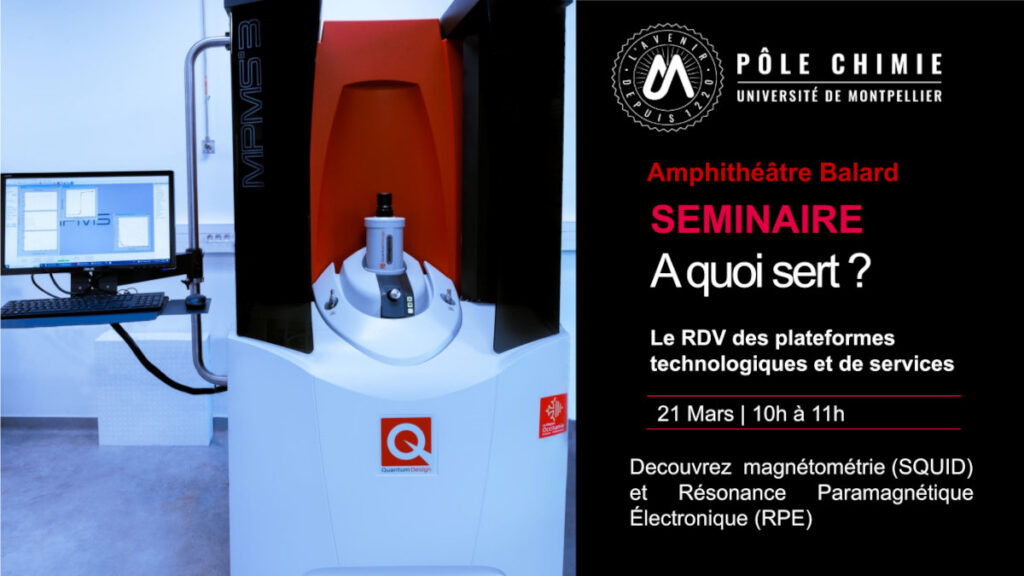Magnetometry (SQUID) and Electron Paramagnetic Resonance (EPR) seminar: "What's it all for?
This event is over!
Come and discover magnetometry (SQUID) and Electronic Paramagnetic Resonance (EPR).

The latest-generation MPMS3 magnetometer from Quantum Design, acquired in 2021, is equipped with a "squid" device for measuring the finest variations in magnetic flux generated by the sample. It enables magnetic properties to be determined at different temperatures (from 1.8 to 400 Kelvin) and magnetic fields (from -7 to 7 Tesla). Its various options enable studies to be carried out on magnetic relaxation time (AC mode), magnetization angle (rotary motor), and even under light irradiation (optical fiber).
EPR is best suited to the study of paramagnetic compounds with one or more unpaired electrons, and in particular to the study of organic radicals generated by various means (heating, irradiation, reaction intermediates, etc.).
About the speakers :
Technical section :
Corine REIBEL, UM research engineer, and Gautier FELIX, CNRS research fellow, are respectively in charge of and scientific coordinator for the "Magnetometry and EPR" department, which includes two Squid magnetometers and an X-band EPR spectrometer, as well as vacuum, thermometry and cryogenics equipment. Corine REIBEL will be your contact for all information and measurement requests.
Examples of scientific projects :
Farah ABDEL-SATER is a PhD student in the first year of her thesis, supervised by Joulia LARIONOVA and Gautier FELIX, in the ICGM's D1 department. Her thesis focuses on the release of free radicals by nanoscale thermal activation using magnetic nanoplatforms.
Fatiha AZROUR is a doctoral student in the third year of her thesis, supervised by Jérôme Rouquette and Mickael Beaudhuin in the ICGM's D4 department. Her thesis focuses on the study of the magnetic and other properties of several Lanthanide compounds in the crystalline state.
Joshua VAULOUP is a third-year PhD student in a collaboration between ICGM's D2 and D4 departments. He works with Laure Monconduit, Moulay Sougrati and Lorenzo Steviano. One of his subjects is the recycling of strategic metals from lithium-ion batteries. He is studying a way of reducing cobalt to its metallic form by mechanochemistry, in order to extract this element selectively by magnetism. He uses the SQUID magnetometer to quantify cobalt reduction.
Access to the campus with a QR code (code creation request to be sent by e-mail). For further information, please contact the Chemistry Department.
Receive a weekly summary of the UM agenda
* By entering your e-mail address you agree to receive the weekly UM agenda summary by e-mail and you acknowledge our privacy policy. You can unsubscribe at any time using the unsubscribe link or by contacting us by e-mail.
